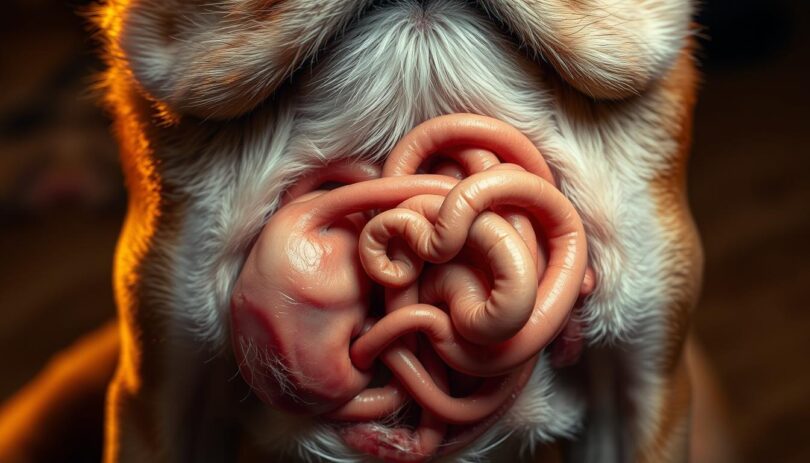Finding the Best Dog Treats for Sensitive Stomach
Over 75% of pet owners report hearing unusual digestive noises from their dogs at least once a month. These rumbles, scientifically called borborygmi, occur when gas moves through the intestines during digestion. While often harmless, these sounds can sometimes signal deeper health concerns when paired with appetite changes.
Normal digestion involves rhythmic muscle contractions called peristalsis, which help break down food. Occasional gurgling typically results from hunger pangs or swallowed air during rapid eating. However, persistent noises combined with behavioral shifts like refusing meals warrant closer attention.
Potential causes range from mild to severe. Dietary indiscretions, sudden food changes, or intestinal parasites frequently trigger these symptoms. In rare cases, underlying conditions like pancreatitis or blockages might require immediate veterinary care. Observing accompanying signs like lethargy or diarrhea helps determine urgency.
This guide explores why dogs experience stomach disturbances and when to seek professional help. Readers will learn practical strategies to address minor issues at home while recognizing red flags demanding expert intervention. Understanding these digestive cues empowers owners to make informed decisions about their pet’s well-being.
Understanding Dog Stomach Gurgling
Canine digestive systems produce various sounds during daily activities. These rumbles, known medically as borborygmi, often occur when food or air travels through the gastrointestinal tract. Many owners notice these noises after meals or physical activity.
What Are Normal Digestive Noises?
Healthy digestion involves rhythmic muscle contractions called peristalsis. This process pushes nutrients through the intestines while mixing them with digestive enzymes. Gas bubbles naturally form during this activity, creating soft gurgles that typically last seconds to minutes.
Veterinary studies show these sounds peak 2-3 hours post-meal. They may also increase if a pet exercises shortly after eating. Most dogs show no discomfort during normal digestive processes.
How Peristalsis Creates Gurgling Sounds
The digestive system works continuously, even without recent food intake. Empty intestines still contract to maintain muscle tone, which can produce audible noises. Factors like swallowed air from fast eating or water consumption often amplify these sounds.
Key differences exist between harmless activity and concerning disturbances. Normal noises usually maintain steady rhythm and volume. They rarely accompany behavioral changes like pacing or whining. Understanding these patterns helps owners distinguish routine digestion from potential issues.
Recognizing When to Worry
While occasional digestive sounds are normal, certain patterns demand attention. Unusual noises paired with behavioral changes often indicate deeper issues needing professional evaluation. Learning to spot warning signs helps owners act swiftly when their pet’s health declines.
Identifying Concerning Symptoms
Veterinarians recommend watching for these red flags:
Persistent diarrhea or vomiting lasting over 24 hours often signals infections or parasites. Blood in stool or vomit requires immediate care. Lethargy paired with gas could point to bowel disease or obstructions.
Multiple symptoms appearing together heighten urgency. An upset stomach with refusal to eat and unusual noises may suggest inflammatory bowel disease. Studies show 1 in 5 dogs with chronic gas eventually need treatment for intestinal disorders.
Time-sensitive issues like foreign object ingestion demand quick action. If your pet shows abdominal swelling or pain when touched, contact a vet immediately. Early intervention prevents complications from blockages in the intestines.
While mild cases might resolve with rest, recurring issues warrant exams. Parasites and chronic conditions like pancreatitis require tailored solutions. Experts advise scheduling visits when symptoms disrupt daily routines or last beyond two days.
Common Causes and Triggers
Many pet owners wonder why their dog’s digestion sometimes sounds like a bubbling brook. While most causes are harmless, understanding the source helps determine when to take action. Let’s explore everyday factors and less common conditions behind these disturbances.
Hunger, Air Consumption, and Gas
An empty stomach often triggers loud contractions as digestive juices prepare for food. These hunger-related noises typically resolve after meals. Dogs eating too fast may swallow excess air, creating gas bubbles that produce noticeable sounds during digestion.
Routine plays a role – skipping meals or irregular feeding times can amplify these effects. Providing smaller, frequent portions helps maintain steady gut activity. Always ensure fresh water availability, as dehydration sometimes mimics hunger signals.
Food Changes and Inflammatory Issues
Sudden diet shifts disrupt the intestinal balance of enzymes and bacteria. This imbalance often leads to temporary noises and soft stools. Gradual food transitions over 7-10 days allow the system to adapt smoothly.
Chronic issues like inflammatory bowel disease (IBD) cause persistent symptoms. Affected pets may show recurring gas, appetite changes, or weight loss. While less common, IBD requires veterinary diagnosis through specialized tests and imaging.
Foreign objects or toxic substances accidentally eaten can create dangerous blockages. If unusual noises follow scavenging behavior, monitor closely for vomiting or lethargy. Early detection prevents complications in the bowel or intestines.
Managing Digestive Health Through Diet & Routine
Strategic feeding practices can transform digestive comfort for pets. Tailoring meals and schedules helps reduce gastrointestinal disturbances while supporting nutrient absorption. Let’s explore practical methods to create harmony in your companion’s daily routine.
Optimizing Feeding Techniques
Slow feeder bowls combat rapid eating by creating physical barriers. These tools extend meal times, reducing swallowed air that leads to gas buildup. Studies show dogs using these bowls experience 40% fewer digestive noises post-meal.
Splitting daily portions into 3-4 smaller meals prevents stomach overload. This approach maintains steady digestion throughout the day. Always measure portions using a kitchen scale – guessing amounts often causes overfeeding.
Dietary Adjustments for Sensitive Systems
Transitioning to specialized formulas requires patience. Mix 25% new food with current meals for 3 days, then increase gradually over 10 days. Look for easily digestible proteins like turkey or lamb in veterinary-recommended diets.
Consistent feeding times regulate bowel activity. Establish fixed morning and evening routines, avoiding late-night snacks. Record reactions to different foods in a journal – patterns often reveal hidden triggers.
Simple changes yield significant results. Proper hydration and fiber-rich vegetables like pumpkin can soothe irritated intestines. Remember, persistent issues may require professional guidance to rule out underlying conditions.
Addressing Medical Concerns and Vet Intervention
Pet owners often face tough decisions about when digestive issues need professional care. While minor upsets might resolve on their own, certain patterns demand swift action to protect your companion’s health.
Recognizing Signs of Gastrointestinal Disorders
Persistent vomiting or diarrhea lasting over 24 hours often signals serious trouble. These symptoms paired with loud intestinal noises could indicate parasites like giardia or dangerous obstructions. A case study showed a Labrador retriever developed life-threatening complications after three days of untreated diarrhea from intestinal worms.
Watch for these emergency indicators:
• Dry heaving without producing vomit
• Bloated abdomen with painful reactions to touch
• Blood in stool or vomit
Subtle changes matter too. Increased gas production or unusual gurgling patterns might mean the dog’s digestive system struggles with inflammatory bowel disease. Veterinary exams become crucial when symptoms disrupt sleep patterns or daily activities.
Owners should contact their veterinarian immediately if they notice multiple warning signs. Diagnostic tools like X-rays or fecal tests help identify blockages and parasites quickly. Early treatment often prevents costly surgeries and speeds recovery for common gastrointestinal issues.
My dog’s stomach gurgling like crazy and he won’t eat: Practical How-To Tips
When unusual intestinal activity disrupts a pet’s routine, simple interventions often restore comfort. These evidence-based approaches help address discomfort while preparing for potential veterinary consultation.
Immediate Soothing Measures
Start with gentle abdominal massage using circular motions. This technique helps move trapped gas through the digestive tract. Offer small amounts of room-temperature water every 30 minutes to prevent dehydration.
Introduce bland meals like boiled chicken and rice once vomiting stops. Use puzzle feeders to slow rapid eaters – studies show these tools reduce swallowed air by 60%. Avoid treats or new foods until symptoms resolve completely.
Home Care and Stress Reduction Strategies
Maintain consistent feeding schedules to regulate stomach activity. Calming supplements containing L-tryptophan may ease anxiety-related digestive issues. Create quiet resting areas away from household commotion.
Track patterns in a health journal. Note frequency of noises, appetite changes, and stool quality. Persistent gurgling sounds or excessive gas warrants professional evaluation even without other symptoms.
Remember: These methods manage temporary discomfort but don’t replace veterinary care. If the dog shows worsening symptoms like repeated vomiting, seek immediate assistance. Proper home care combined with professional guidance ensures optimal digestive health
Wrapping Up With Key Steps for a Healthier Dog
Maintaining your dog’s digestive health starts with recognizing normal stomach activity versus concerning symptoms. Occasional rumbles during hunger or after meals typically resolve without intervention. Persistent sounds paired with appetite changes often trace to swallowed air, diet shifts, or underlying conditions like bowel disease.
Three essential steps keep digestive systems balanced:
1. Serve measured meals using slow-feed bowls to reduce gas
2. Schedule veterinary visits if vomiting or diarrhea persists
3. Transition foods gradually to prevent stomach irritation
Preventive care minimizes risks of obstructions and chronic issues. Simple routines—consistent feeding times, hydration checks, and bland diet options—support smoother digestion. Watch for warning signs like abdominal swelling or blood in stool, which demand immediate vet attention.
Small adjustments create lasting change. A dog with regulated meals and stress-free environments often shows fewer digestive disruptions. When unusual sounds continue despite home care, trust professional guidance to uncover hidden causes. Prioritizing these practices leads to calmer stomachs and happier, healthier dogs.
FAQ
What home remedies help reduce excessive stomach gurgling?
Offer bland foods like boiled chicken and rice, ensure hydration, and use slow feeder bowls to minimize air intake. Pumpkin puree (unsweetened) can soothe mild indigestion. Avoid sudden diet changes or fatty treats.
When should I take my dog to the vet for stomach issues?
Seek immediate care if your pet shows bloating, unproductive vomiting, bloody stool, or refuses food/water for over 24 hours. These could indicate obstructions, parasites, or inflammatory bowel disease requiring professional diagnosis.
How can I tell if my dog’s stomach noises are normal?
Occasional gurgling (borborygmi) is typical during digestion as muscles move food through the intestines. Persistent loud noises paired with vomiting, diarrhea, or lethargy signal potential issues like gas buildup or gastrointestinal disorders.










Leave a Comment